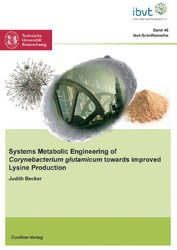| Fachbereiche | |
|---|---|
| Buchreihen (97) |
1382
|
| Nachhaltigkeit |
3
|
| Gesundheitswesen |
1
|
| Geisteswissenschaften |
2372
|
| Naturwissenschaften |
5408
|
| Mathematik | 228 |
| Informatik | 320 |
| Physik | 980 |
| Chemie | 1364 |
| Geowissenschaften | 131 |
| Humanmedizin | 243 |
| Zahn-, Mund- und Kieferheilkunde | 10 |
| Veterinärmedizin | 108 |
| Pharmazie | 147 |
| Biologie | 835 |
| Biochemie, Molekularbiologie, Gentechnologie | 121 |
| Biophysik | 25 |
| Ernährungs- und Haushaltswissenschaften | 45 |
| Land- und Agrarwissenschaften | 1005 |
| Forstwissenschaften | 201 |
| Gartenbauwissenschaft | 20 |
| Umweltforschung, Ökologie und Landespflege | 148 |
| Ingenieurwissenschaften |
1798
|
| Allgemein |
98
|
|
Leitlinien Unfallchirurgie
5. Auflage bestellen |
|
Erweiterte Suche
Systems Metabolic Engineering of Corynebacterium glutamicum towards improved Lysine Production (Band 46)
Judith Becker (Autor)Vorschau
Inhaltsverzeichnis, Datei (57 KB)
Leseprobe, Datei (71 KB)
L-lysine is an essential amino acid which is mainly applied as supplement in animal feed. With a world
market of around 1,000,000 t/a it is one of the most important fermentation products. The gram positive soil
bacterium Corynebacterium glutamicum thereby serves as major production organism. The aim of the
present work was rational strain engineering of lysine production by C. glutamicum using a systems-oriented
approach. Detailed studies on this organism exposed lysine biosynthesis, NADPH metabolism, TCA cycle
and precursor supply as key pathways. The central role for strain characterization can here be assigned to
13C metabolic flux analysis, which was also applied in this work to obtain a detailed insight into the cellular
physiology. Based on an existing model, the network for flux determination was extended in the present
study to increase the number of estimable flux parameters.
With regard to strain optimization, targeted modulation of enzyme activities within the cell is crucial to
increase or reduce carbon conversion of the selected pathways. The common toolbox such as over
expression by promoter exchange or gene deletion was complemented with the method of start codon
exchange allowing permanent modulation of enzyme activity. As host-strains for target evaluation,
genetically defined, wild type based lysine producers were used which all express a feedback-deregulated
variant of aspartate kinase. The most beneficial modifications identified in this work comprised over
expression of diaminopimelate dehydrogenase, down-regulation of TCA cycle by attenuation of isocitrate
dehydrogenase and engineering of the NADPH metabolism. By subsequent implementation of beneficial
targets in a single strain, a rationally designed lysine hyper-producer was created. This exhibited remarkable
production properties such as a lysine-HCl titre of 120 g L-1 and a carbon conversion yield of up to 55 %.
| ISBN-13 (Printausgabe) | 3869554266 |
| ISBN-13 (Printausgabe) | 9783869554266 |
| ISBN-13 (E-Book) | 9783736934269 |
| Sprache | Englisch |
| Seitenanzahl | 180 |
| Auflage | 1 Aufl. |
| Buchreihe | Schriftenreihe des Institutes für Bioverfahrenstechnik der Technischen Universität Braunschweig |
| Band | 46 |
| Erscheinungsort | Göttingen |
| Promotionsort | TU Braunschweig |
| Erscheinungsdatum | 31.08.2010 |
| Allgemeine Einordnung | Dissertation |
| Fachbereiche |
Biologie
Biochemie, Molekularbiologie, Gentechnologie |








